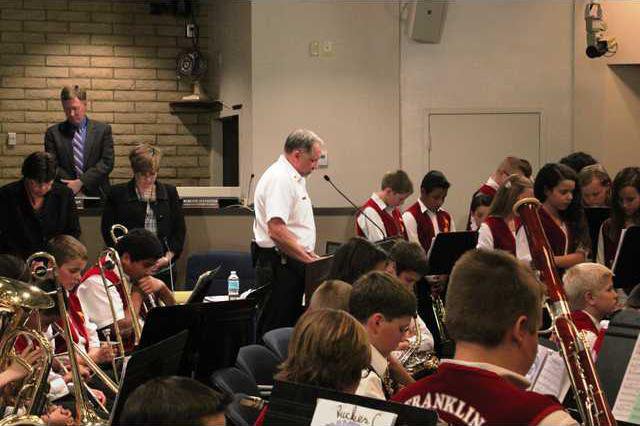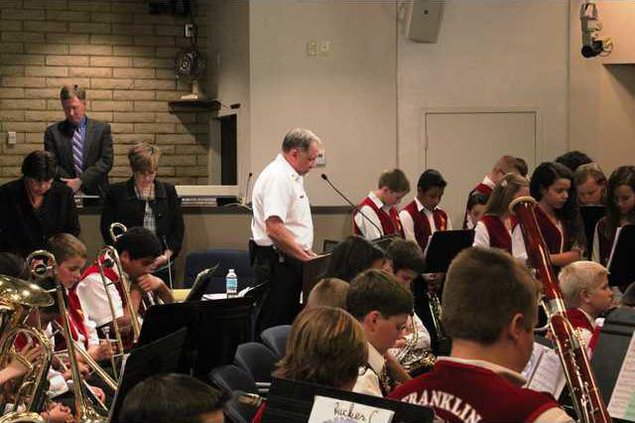![]() MESA, Arizona — Last fall, Mesa Public Schools received a letter from a national organization requesting prayers before the start of public school board meetings be removed and threatened a lawsuit if that action wasn’t taken.
MESA, Arizona — Last fall, Mesa Public Schools received a letter from a national organization requesting prayers before the start of public school board meetings be removed and threatened a lawsuit if that action wasn’t taken.
Like many deliberative bodies wanting to avoid possible costly litigation, members of the governing board voted to replace formal prayer with a moment of silence.
But they also recognized that such prayers were an important part of the community and an honored and long-standing tradition at meetings.
“I didn’t want us to do completely away with them,” said board member Michelle Udall.
School board member Steven Peterson agreed, and said the feedback from community members also showed support for the practice.
“While opinions varied, we generally had more support for (prayers) than against,” he said.
After taking a careful look at what they had been doing, Udall said school district officials realized that it had not been an appropriate and inclusive policy.
“Prayers had been offered on a rotating basis by members of the superintendency, and not from the community,” she said.
The five members of the school board agreed it was worth spending a little more time researching what would be appropriate and legal for the district.
Udall said she spoke to her father-in-law, David K. Udall, a lawyer and former city council member. He directed her to a group of Arizona lawyers who specialize in such matters pro bono and encouraged her to proceed.
“Prayer before meetings is part of the fabric of our society,” David Udall said. “What are we thinking letting a group of outsiders change that?
“Those who are trying to drive religion from the public square are picking us off one by one,” he said. “We need to be diligent — religion is being attacked at every level. Find good advice — and it is available — when the threat comes.”
Michelle Udall wrote an opinion piece, which was published in several local publications, stating that she believes offering prayers at the beginning of meetings, if done in an appropriate manner, can have many benefits.
It "helps set the tone of the deliberations to follow. It solemnizes the proceedings, encourages a sense of cooperation, and is a means of expressing confidence in the future and recognition for that which is worthy of appreciation in society," the mother of four wrote.
Mesa Public Schools officials, led by their own in-house legal counsel, began formulating a more appropriate policy by carefully examining cases that stood up in court.
They began to draft a policy that showed "respect for the diverse perspectives of the community," Michelle Udall said. “The opportunity to offer an invocation ought to be opened up to any and all faiths represented in the district.”
The new policy does just that.
In January, Mesa’s governing board voted unanimously in favor of the new policy that was implemented at the Feb. 11 meeting.
All leaders of religious and spiritual organizations from throughout the community have received letters inviting them to an upcoming meeting and to offer a prayer, said Helen Hollands, communications director for Mesa Public Schools.
“The invocation will be part of the pre-meeting activities,” Hollands said. That also includes a musical performance from a local school group.
Several weeks after Mesa’s vote, neighboring Gilbert Public Schools passed a similar policy, reinstating prayer before school board meetings after 14 years of holding a moment of silence.
Michelle Udall, who grew up attending Mesa schools, said another upside to the change is the "opportunity to invite members of the community who may not otherwise attend school board meetings."
“They will have the chance to learn more about what is happening in Mesa schools and how they can get involved,” she said. “Greater community involvement in schools will benefit all students.”
As far as prayers, those who do not wish to participate can refrain, she said.
“Certainly there is a need for mutual respect for those of all faiths and beliefs,” she said. “School board meetings ought to be a place where tolerant, respectful behavior is modeled and promoted.”
Jill Adair is a freelance journalist in Mesa, Arizona, and an adjunct faculty member at Arizona State University’s Walter Cronkite School of Journalism and Mass Communication.
Mesa school board reinstates prayer before meetings


Latest
-
 Its toxic: New study says blue light from tech devices can speed up blindness
Its toxic: New study says blue light from tech devices can speed up blindness -
 This upset man was turned away from voting polls because he was wearing a MAGA hat; here's what th
This upset man was turned away from voting polls because he was wearing a MAGA hat; here's what th -
 Facebooks stock suffers the worst single-day market loss in history. Heres how much Mark Zuckerber
Facebooks stock suffers the worst single-day market loss in history. Heres how much Mark Zuckerber -
 Roseanne Barr speaks with Sean Hannity in first TV interview since racist tweet controversy. Here ar
Roseanne Barr speaks with Sean Hannity in first TV interview since racist tweet controversy. Here ar


